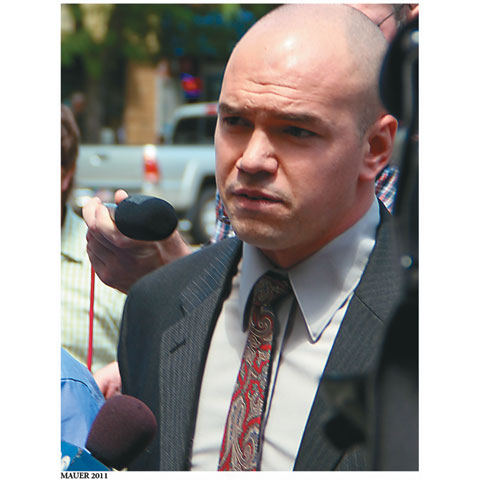I want to say a word for radicalism — for the role of the radical in building a movement to confront climate change, the most urgent crisis human beings have ever faced. I want to start with two scenes, and two speakers, who embody the imperatives, and the limitations, of the moment in which we find ourselves.
July 26, 2011. Inside a federal courtroom in Salt Lake City, Utah, a 30-year-old climate activist named Tim DeChristopher is sentenced to two years in prison and a $10,000 fine for disrupting a Bureau of Land Management auction of oil and gas leases back in December 2008. Registered as Bidder #70, he managed to win bids worth $1.8 million for some 22,000 acres of public land near Canyonlands National Park — bids he had no way of paying. He had acted spontaneously, on his conscience, engaged in nonviolent resistance to the heedless new extraction of fossil fuels that are catastrophically heating the planet and threatening innumerable innocent lives.
Weeks before his sentencing, DeChristopher told Rolling Stone's Jeff Goodell: "I'm a climate-justice activist. . . . We want a radically different world. We want a healthy, just world." But first, he said, "we need to get the fossil fuel industry out of the way. First we've got to overthrow the corporate power that is running our government." He understands what that requires. "It will involve confrontation and it will involve sacrifice."
At his sentencing, standing before the federal judge, DeChristopher concludes a long, eloquent statement that spreads across the Internet and galvanizes a growing climate-justice movement:

Tim DeChristopher |
"This is not going away. At this point of unimaginable threats on the horizon, this is what hope looks like. In these times of a morally bankrupt government that has sold out its principles, this is what patriotism looks like. With countless lives on the line, this is what love looks like, and it will only grow. The choice you are making today is what side are you on."
A month after DeChristopher speaks those words, the largest civil-disobedience action in a generation begins in front of the White House, where 1,253 climate activists are arrested protesting the Keystone XL pipeline, the project that would tap the second-largest carbon deposit on Earth. (This Sunday, February 17, tens of thousands more will converge on Washington to demand that Barack Obama reject the pipeline once and for all.)
November 4, 2012. It's the Sunday before Election Day, a week after Hurricane Sandy's hellish landfall, and Congressman Ed Markey stands before a capacity crowd inside the Town Hall of Arlington, Massachusetts. Hundreds of constituents have gathered on 48 hours notice for what the congressman has billed as an "emergency meeting" on climate change. Flanked by Kevin Knobloch, president of the Union of Concerned Scientists, and Mindy Lubber, representing $11 trillion in assets as the director of the Investor Network on Climate Risk, Markey displays satellite photos of Boston illustrating that huge sections of the city — like the entire Back Bay — would be underwater if Sandy had hit the Hub instead of New York and New Jersey.